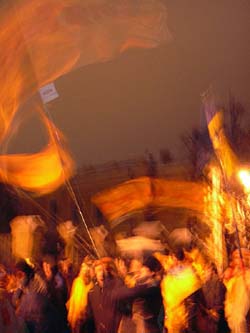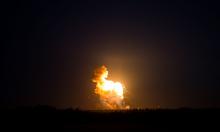Ukraine celebrates orange anniversary and economic debacle
”The orange revolutionaries” failed to keep any of the promises, which they gave people a year ago in Kiev
Ukraine celebrates the first anniversary of the notorious orange revolution. Ukrainian President Viktor Yushchenko signed an adequate decree last Saturday to immortalize last year's events in Ukraine, which eventually ended with his election as the president. The president titled the decree as “About the Day of Freedom,” which will be celebrated in Ukraine every year on November 22nd. 
There was no positive choice in the 2004 presidential campaign in Ukraine. The people were basically voting “against” rather than “for.” The Ukrainians had to choose from the bad and the unacceptable, to choose the lesser evil, so to speak. Political technologies do not reach desirable results all the time. As for the expert community, it frequently falls victim of mythological constructions, which it creates itself. As a result, objective reality and the expert community exist separately from each other.
Economist Mikhail Delyagin said a year ago that the two central figures of the orange revolution in Ukraine would be leading the country towards the West, whereas present-day Russia had nothing to offer Ukraine. Yanukovich, Delyagin said, would be doing it slowly, weighing every step, while Yushchenko would rush to the West and “smash his forehead, because no one is waiting for Ukraine in the West.” One may only guess, which actions Viktor Yanukovich would take if he won the presidential race in Ukraine a year ago.
The foreign political strategy of the new Ukrainian government proved to be rather predictable, simple and could be formulated as follows: “Go West, watch Moscow.” It is noteworthy that Yushchenko's team did not stir up the NATO issue during the presidential campaign, although they did emphasize the intention to cooperate with the European Union. As soon as Yushchenko took the office of the president, the above-mentioned preferences changed: NATO became the first priority, whereas Ukraine's EU membership was pushed into the background and forgotten. As for Ukraine-Russia relations, Viktor Yushchenko set out his readiness to join Russia, Belarus and Kazakhstan in the creation of the joint economic space and expressed his disdain towards Russia's military presence on the Ukrainian territory (The Russian Black Sea Navy). Viktor Yushchenko developed friendly relations with his colleague, the President of Georgia Mikhail Saakashvili on the base of their common passion for the USA (not Europe) and dislike against Russia. The two presidents started reanimating outdated economic projects (GUUAM, which has already lost some of its capital letters) and initiated new ones (the union of democratic states of the Black Sea basin). Once they built democracy in their own states, the two revolutionary presidents raised the subject of democratic export to the “enthralled” states, particularly Russia and Belarus.
Viktor Yushchenko originally focused his energy on foreign politics, organized numerous foreign trips, and left issues of home policies to his team. As a result, the new Ukrainian government withdrew practically all money from the national economy, deprived free economic zones of their preference, launched the re-privatization process and showed pressure on Russian business in Ukraine. The government was trying to leave Russia behind in the race for the WTO membership. Ukrainian “professional politicians” said a year ago that the national economy would grow by 8.5 percent, although the index made up only three or four percent.
”The orange revolutionaries” failed to keep any of the promises, which they gave people a year ago in Kiev: to create five million new jobs, prove the criminal regime of the previous Ukrainian government, investigate notorious crimes (the killing of journalist Gongadze and the poisoning of Yushchenko).
Even the opponents of the new government did not expect such a convincing debacle. To make matters worse, the “achievements” of the new Ukrainian government became quite a disappointment for the West, which spent so much time, energy and funds to bring Viktor Yushchenko to the president's office. Many Ukrainians, who voted for Yushchenko a year ago, feel disappointed and deceived.
Deputy Director of the institute for social and political psychology, Lubov Naidenova, revealed rather interesting numbers on November 21st of the current year. Only 17 percent of the Ukrainian population support the celebration of the orange anniversary, whereas 55 percent of the polled disapproved the new national holiday in Ukraine.
To crown it all, Yushchenko's team has split into two to blame each other for economic and political failures. Yushchenko acknowledged that Yulia Timoshenko's government made Ukraine stand on the brink of an abyss. Tymoshenko stated in her turn that she two orange wings had been torn. One may only guess, which of the torn wings has the body, and if the “orange bird” had a head at all.
Aleksei Kovalev
Discuss this article on Pravda.Ru FORUM
Subscribe to Pravda.Ru Telegram channel, Facebook, RSS!




